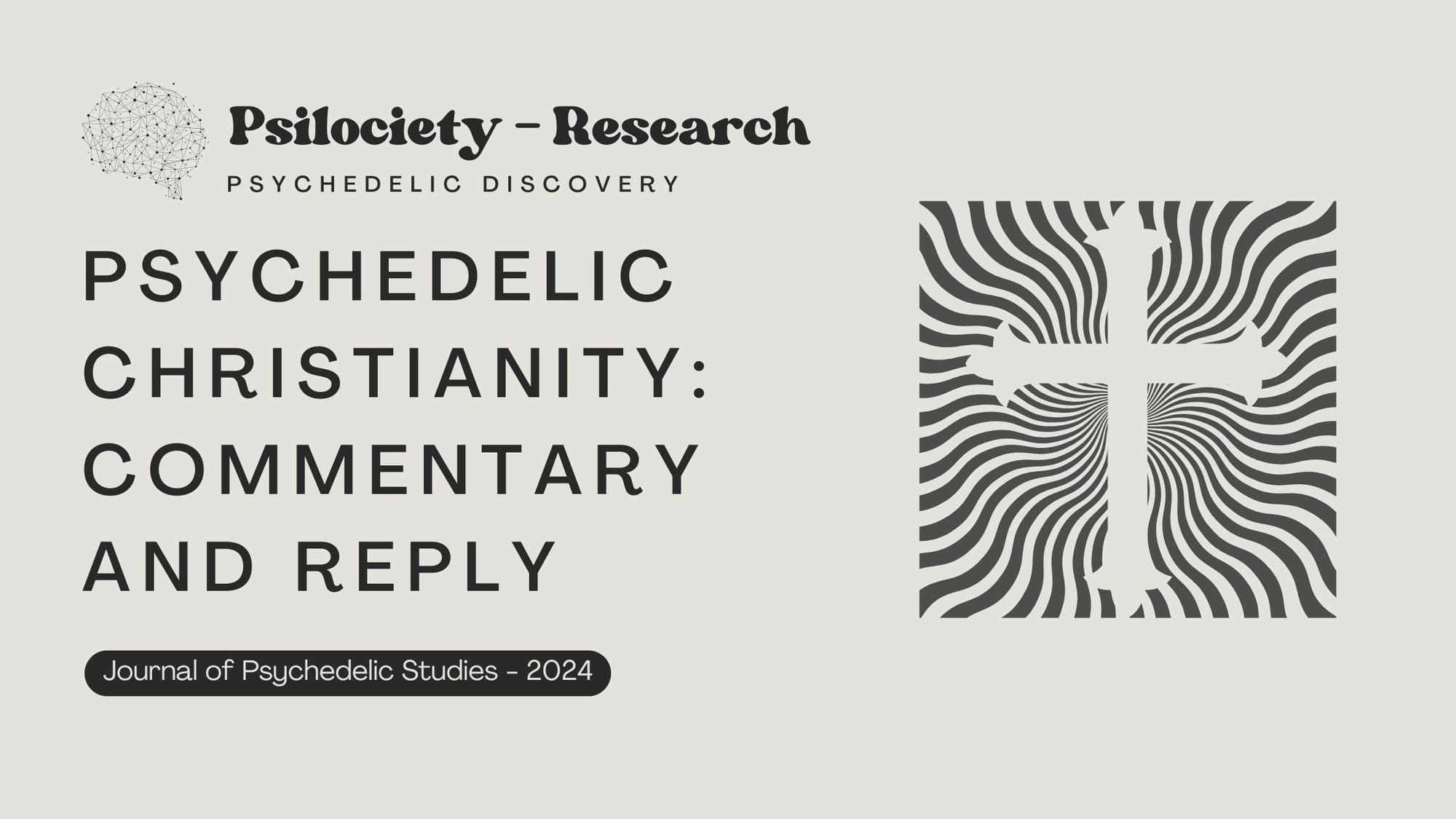Psychedelic Christianity: Commentary and Reply
This commentary explores the historical and modern intersections between psychedelics and Christianity, highlighting theological and institutional challenges.

Title & Introduction
- Paper Title: Psychedelic Christianity: Commentary and Reply
- Published In: Journal of Psychedelic Studies
- Publish date: July 19, 2024
- Authors: Michael J. Winkelman, G. William Barnard, Marc G. Blainey, Jerry B. Brown, Thomas B. Roberts, Joseph Lorenz, Jaime Clark-Soles, William A. Richards, Harry T. Hunt, Timothy R. Gabrielli, David M. Odorisio, Tracy J. Trothen, Brad Stoddard, Paul Jonathan Ungerland II, George G. Lake, J. Kaleb Graves, Bryan McCarthy, Hunt Priest
- Objective: To provide academic and theological commentary on the historical and contemporary intersections between Christianity and psychedelic use, responding to McCarthy & Priest’s 2024 article.
- Importance: The discussion of psychedelic Christianity challenges traditional Christian theology, explores entheogenic sacraments, and highlights how altered states of consciousness influence faith, community practices, and institutional acceptance.
Summary & Takeaways
Key Takeaway: Psychedelics have played a historical and contemporary role in Christianity, yet their potential to transform Christian theology and practice remains contested among scholars and religious authorities.
Practical Application:
- Religious leaders can explore psychedelics' potential in pastoral care and spiritual retreats.
- Psychedelic Christianity may help revitalize spiritual engagement within modern faith communities.
- Further research and dialogue are needed to integrate entheogenic experiences into Christian traditions responsibly.
Key Background Information
- Context: While psychedelics have influenced various religious traditions, their role in Christianity remains debated. Some scholars argue for historical entheogenic Christian practices, while others view modern psychedelic use as a distinct spiritual evolution.
- Hypothesis: Psychedelic experiences shape Christian theology, spiritual authority, and faith communities, leading to either deeper engagement or institutional challenges.
Methodology
- Study Design: Thematic analysis of historical, theological, and experiential perspectives on psychedelic Christianity.
- Participants: Commentary authors, including scholars in anthropology, religious studies, and theology.
- Intervention/Exposure: Examination of psychedelic experiences in Christian traditions and their theological implications.
- Controls: Not applicable; a theoretical discussion based on historical and contemporary cases.
- Duration: Ongoing academic discourse.
Key Findings
Primary Outcomes:
- Psychedelic Christianity has historical roots in early entheogenic practices, yet much of this history has been suppressed or overlooked.
- Contemporary psychedelic Christianity varies from informal spiritual experimentation to structured sacramental use within groups like Santo Daime and the Native American Church.
- Theological shifts include re-examining mystical experiences, divine encounters, and religious authority structures.
Secondary Outcomes:
- Christian psychedelic users report both enhanced faith and theological challenges following their experiences.
- Religious institutions may struggle with integrating psychedelics due to doctrinal constraints and institutional conservatism.
- Psychedelics could either strengthen Christian community bonds or fragment traditional church structures depending on their adoption.
Interpretation & Implications
- Conclusion: Psychedelics pose both opportunities and challenges for Christianity, influencing personal faith, church structures, and theological discourse.
- Implications: If psychedelics gain broader acceptance, Christian institutions may need to reconsider their stance on mystical experiences and sacramental practices.
- Limitations: The study is largely theoretical and commentary-based, lacking empirical data on widespread Christian psychedelic use.
Researchers & Publication
- Researchers: Michael J. Winkelman (Arizona State University), G. William Barnard (Southern Methodist University), Marc G. Blainey (University Health Network, Toronto), Jerry B. Brown (Florida International University), Thomas B. Roberts (Northern Illinois University), Joseph Lorenz (Facultés Loyola, Paris), Jaime Clark-Soles (Southern Methodist University), William A. Richards (Johns Hopkins University), Harry T. Hunt (Brock University), Timothy R. Gabrielli (University of Dayton), David M. Odorisio (Pacifica Graduate Institute), Tracy J. Trothen (Queen’s University), Brad Stoddard (McDaniel College), Paul Jonathan Ungerland II (DaLand LLC), George G. Lake (Independent Scholar), J. Kaleb Graves (Eno River Unitarian Universalist Fellowship), Bryan McCarthy (University of Pittsburgh, Greensburg), Hunt Priest (Ligare: A Christian Psychedelic Society)
- Publication Name: Journal of Psychedelic Studies
- Study URL: https://doi.org/10.1556/2054.2024.01356

